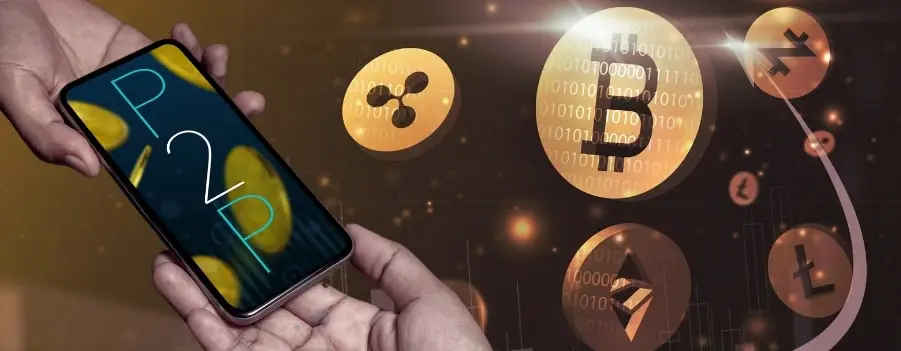The evolution of peer-to-peer rewards in Crypto networks

The history of peer-to-peer (P2P) rewards in crypto networks has been one of the most important events in the blockchain and cryptocurrency space. P2P networks were initially a way to share and communicate files, which implies decentralized communication models connecting nodes. The emergence of cryptocurrencies like Bitcoin, Litecoin, and Ethereum has also posed a significant learning curve for the use of P2P among sellers of various items for decentralized selling. In addition, the introduction of smart contracts and decentralized applications (dApps) has broadened the P2P network application scope, demonstrating their use cases beyond just exchanging currencies. As a result, P2P incentives in the cryptographic industry are becoming essential incentives to guarantee that the network is secure, the participants are engaged, and the blockchain industry experiences development.
Historical Context of P2P Rewards
Peer-to-peer (P2P) rewards have a historical narrative that stems from digital networking and the growth of decentralized systems. As blockchain technology and cryptocurrency technologies expanded, this concept gained popularity as it enabled users to exchange money in a secure and direct manner on a platform.
The Early Days of Bitcoin
The development of peer-to-peer (P2P) rewards for cryptocurrency networks transformed the currency system by introducing a decentralized structure. Bitcoin was one of the early adopters, having been born in 2009. Bitcoin’s early period of operation was characterized by a Proof of Work (PoW) consensus algorithm that encouraged miners to maintain the network through P2P rewards. An innovative technique known as block mining or PoW, used mining to validate transactions and rewarded miners with bitcoins. The final result was to encourage the creation of new blocks and promote network growth. This principle has had a substantial effect on the advancement of blockchain technology and digital currency ecosystems.
The Emergence of Altcoins
Altcoins were created to address the deficiencies of Bitcoin, including its safety, utility, and speed. Namecoin was the first altcoin to enter the market, and it enabled users to register domain names without centralized control, making it less prone to censorship. Altcoins differed from each other in how they modified the Bitcoin main source code to obtain different values. Litecoin achieved its goal of providing fast transactions, while Peercoin implemented PoS for validation purposes. This division brought a variety of players onto the scene as the cryptocurrency system grew and innovated faster.
How P2P Rewards Work
A P2P rewards program encourages users to join a site, app, or service to earn rewards. To invite someone, use your unique link or code; when they join, you will receive a reward, typically points, credits, or discounts that you can use to shop or purchase anything. P2P rewards serve as a simple means to disseminate information and expand the user base, rewarding both parties when a new member joins. When you refer friends, the provider helps to retain them, as fewer people are likely to leave when referred by friends. The referred parties get bonuses for joining, and the referrers also receive awards. As a result, P2P rewards stimulate connections, trust, and popularity, leading to better user acquisition and making customers more loyal and happy with the service.
The Role of P2P Rewards in Network Security
A crypto network’s cybersecurity is preserved through peer-to-peer (P2P) reward programs that encourage users’ active participation in the network, thereby fostering its growth and reinforcement. Moreover, P2P rewards provide individuals with an incentive to partake in governance processes, authenticate and confirm transactions, and contribute to the network’s maintenance and security.
The built-in security measures of blockchain technology are a boon to crypto casinos. A blockchain records all transactions and encrypts them, making them almost impossible to modify.
Engaging features such as crypto casino free spin in P2P rewards programs are sufficient to attract a large number of participants, bolster network activity, and enhance security. Crypto casinos can increase user engagement and strengthen the network’s security by providing free spins to encourage participation and validation.
Future Prospects for P2P Rewards
The future of P2P rewards appears promising. Significant growth and innovation are anticipated in various sectors. P2P rewards are anticipated to serve as the primary factor in businesses’ profitability as they endeavor to increase consumer engagement and loyalty. The integration of AI, machine learning, and data analytics in customized P2P reward programs is part of this revolution.
In keeping with the company’s business partnership goals, the introduction of sustainable practices could provide a foundation for P2P rewards. In the digital era, P2P rewards can be interconnected with cryptocurrency, blockchain, and online gaming platforms, as well as other new trends. As a result, a more extensive and varied landscape can be established to facilitate the utilization of P2P rewards for the purposes of community development, trust, and active engagement.
Conclusion
In conclusion, P2P rewards in the cryptocurrency sector are evolving, and the concept may be viewed as the next stage of development and maturation for the blockchain and crypto industries. From decentralized communication formats to sophisticated blockchain-based P2P crypto exchanges, blockchain technology has motivated network participants and dramatically increased community involvement. The groundbreaking results of P2P rewards in the creation of decentralized currency through proof-of-work consensus algorithms were emphasized by early initiatives, such as Bitcoin. In the future, P2P rewards have the potential to impact sustainable productivity significantly, personalized/targeted benefits, and technological systems.